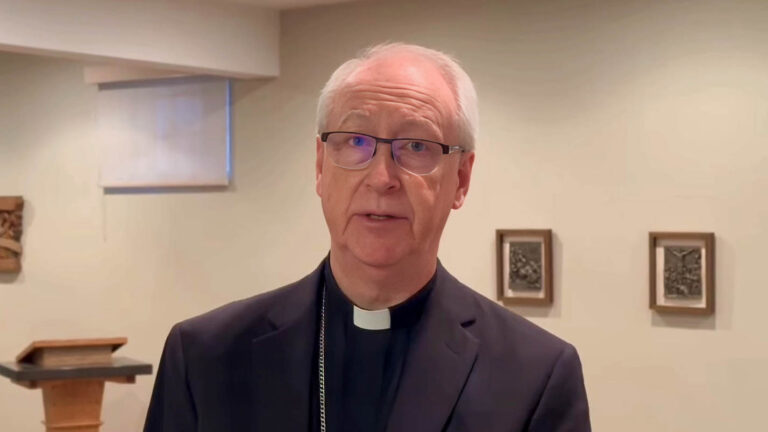Homily
[Isaiah 56:1, 6-7; Psalm 67; Romans 11:13-15, 29-32; Matthew 15:21-28]
For this special parish anniversary mass, we have from Saint Matthew’s Gospel a text, which is admittedly very challenging to understand. It involves an encounter between Jesus and a Canaanite woman, who comes to him seeking healing for her daughter. Surprisingly, the Lord appears indifferent and dismissive, even using very disparaging language as he speaks with her. How can we understand this and thus what the Lord is saying to us as we celebrate the life of this parish? It is necessary that we grasp first the context in which the meeting takes place, and then move to the encounter itself. To develop this, I propose what I hope will serve as a helpful analogy.
This past week, I have heard from three different people stories of serious difficulties they encountered with air travel. Due to reasons beyond anyone’s control, what had been the original travel itineraries were dramatically changed. The re-routing these people were forced to take bore no resemblance to what they had originally expected, with their final itinerary difficult to reconcile with logic.
The Gospel passage revolves around unexpected re-routing, a travel itinerary that defied all expectation and left onlookers unsure of the reasoning behind it. The “route alteration” happens when Jesus travels to the region of Tyre and Sidon, which lay outside the land of Israel. However, this was not caused by factors beyond anyone’s control. Rather, Jesus deliberately chooses this itinerary as belonging to his saving mission. But the people of his day would have seen this as an inexplicable route change. To understand why, let’s keep in mind the general expectations pertaining to the work of the awaited Messiah.
God’s Anointed One, the Messiah, was to go first to the House of Israel, given that God had chosen and formed them as a people. This is why we hear Saint Paul anguishing in his letter to the Romans about the rejection of Jesus by Israel. At the same time, though the Messiah’s mission would be to Israel first, yet it was also to embrace all people in God’s saving action. We hear this universal intention in the prophecy of Isaiah. Yet, God’s preference for Israel was at times misinterpreted in an exclusive sense. So, for many of the people of Jesus’s day, the Messiah’s expected itinerary should have been charted within the land of Israel. So, they would wonder: why is Jesus “re-routing” himself toward foreign territory? Furthermore, it was not uncommon for Gentiles to be looked upon in derogatory fashion, even likened to dogs. This would have made the itinerary chosen by Jesus even more incomprehensible. Why is he going there, and why specifically to them?
So, there’s the context. Now, let’s consider the encounter itself between Jesus and the woman from the foreign territory.
When our travel plans are disrupted, we find ourselves at the mercy of the airlines. They are the only ones who can get us to our destination, yet it will sometimes happen that they appear to us indifferent to our plight in spite of our persistent pleas for assistance. As the Gospel account continues, the woman approaches Jesus because she senses that he is the only one who can get her to the desired destination. Her “arrival point”, though, is not a physical location but the deliverance of her daughter from a demon. The demonic possession had re-routed her daughter’s life and that of her family in a terrible and frightening way, and she intuits that only Jesus can sort it out. Yet it appears that she meets in Jesus a wall of indifference. He initially offers no response, then a dismissive one, seemingly unwilling to help. He then even alludes to the derogatory way in which she and her people were considered as second class, beneath notice. What are we to make of this?
By his deliberate choice of itinerary toward the foreign region, Jesus signals clearly his awareness of his saving mission to all people, including this Canaanite woman. He knows what he is about and what he is doing. Far from being indifferent, Jesus draws forth from her the response of faith that opens the way to his saving power. In effect, he is asking if she is willing to look beyond the limits imposed by human expectation and prejudice to recognize that he has come not only for the people of Israel but also for her. In her persistent and clever responses, Jesus recognizes the expression of precisely that faith and rejoices in it. “Woman,” he says, “great is your faith!” And in response to her faith, the daughter is instantly healed.
How does all this speak to us now as the Lord’s disciples?
Changes in “itinerary” due to circumstances beyond our control happen to everyone, often taking us in directions we did not anticipate. Sudden illness, job loss, or wildfires, for example, can launch us along unexpected trajectories. When situations of unchosen re-routing happen, how does our faith help and guide us? Well, like that of the Canaanite woman, it persistently holds on to the truth that Jesus has come to save us. This means recognizing that, while our life itinerary might change, that of Jesus never does, despite what other people, or our own fears, might be telling us. His route is that of saving help for his people, and from that no circumstance can re-route him. What is more, because he is the Lord, Jesus has the unlimited power to “re-route our re-routing”, if I may put it that way, and lead us to destinations often beyond expectation but always for our good. The faith of the Canaanite woman encourages us to place all of life’s circumstances – with all of its directional shifts – into the hands of Jesus Christ, and trust him to carry us to a good place. He is the only one who can take us to where he knows we need to be.
For seventy years, members of Saint Agnes parish have sought to strengthen one another in this faith. In sacramental celebration and pastoral care, parishioners have led one another to Jesus, in whom alone we find sure direction as we struggle with the many unwanted and often fearful re-routings of our lives. Today we thank God for His fidelity to us in Christ, manifest in the countless blessings poured out upon the people of this parish for the past seven decades. May our celebration today strengthen within us even more the precious gift of faith, by which we surrender all things to the Lord Jesus and come to know the joy of his saving help.
Most Reverend Richard W. Smith
Saint Agnes Parish, Edmonton
August 20th, 2023



